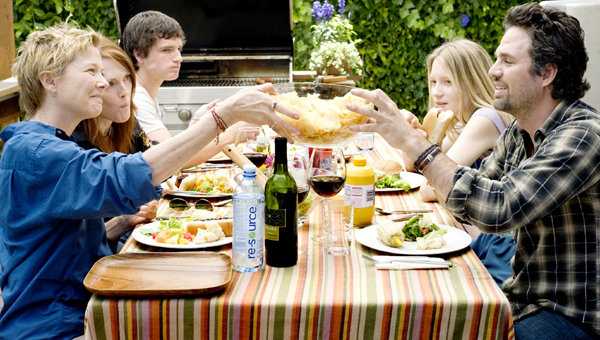The Kids Are All Right Review

Who are you?
That’s the question indie flick The Kids Are All Right asks of its protagonists, delivering a modern twist on that staple of hollywood comedies.
The dysfunctional family.
The film begins on the eve of Joni’s eighteenth birthday; a gifted student on the cusp of womanhood, love and leaving the family home for pastures new.
Her younger brother, the unfeasibly named Laser, has an emotional request to make before Joni flies the familial nest though.
To make contact with their biological father.
You see, Joni and Laser are half sister and brother.
Their birth parents are Nic and Jules respectively; though don’t be fooled by their androgynous names.
Nic and Jules are lesbians, each of whom gave birth to one of their children from the same anonymous sperm donor.
For the past two decades these, ahem, guys have raised their children in blissful suburbia.
But burgeoning adolescence has made Laser’s lack of a male role model in life more acute.
Now she is of suitable age, Joni reluctantly agrees to track down their biological father.
And all goes disarmingly well.
Wary of hurting their mother’s feelings, the siblings clandestinely arrange to meet their “dad”, Paul; who turns out to be as cool a cat any adolescent imagination could possibly conjure for a surrogate father figure.
Of course, this fairytale outcome carry’s painful consequences of its own.
As Paul happily starts assuming a greater role in Joni’s and Laser’s lives, it forces some deep rooted insecurities inherent with any lesbian parenting team to the surface of Nic and Jules’ relationship; with their children and each other.
Now this very 21st century family has to deal with the spectre of a paterfamilias arriving on their sapphic scene.
As I’m in the somewhat unique position of being able to identify with the children from The Kids Are All Right – to a degree at least – I was more than a little intrigued to see how this film would play.
Directed and co-penned by Lisa Cholodenko, who’s drawn on her own life as inspiration, the film has received a great deal of critical acclaim.
And I can see why.
The subject material is fresh and original; the cast nigh on perfect, with Annette Bening and Julianne Moore in understated roles as Nic and Jules respectively.
One horrendously forced musical interlude excepted.
And Mark Ruffalo quietly continues to demonstrate his versatility and excellence as another of those actors to find their voice later on in life.
An indie peer of Robert Downey Jr’s, if you like.
Yet it’s the script that ultimately lets The Kids Are All Right down.
The first half is great; witty, insightful and draws you into the seemingly fully realised world created by Cholodenko and writing partner, Stuart Blumberg.
But about half way through, something happens – which I won’t elaborate on for obvious reasons – that takes you out of the premise skilfully created by these two and leads the audience to a more generic, hollywood form of reality.
A place where hugely illogical actions conspire to unfold for very little reason other than to create tension for the main characters.
Because that’s what it says in the script.
Perhaps the reason this material doesn’t ring true is because neither writer has actually experienced these things in life for themselves.
Yet felt compelled to write by numbers so as to fill in the blanks and make the film more commercial.
It suggests Cholodenko and Blumberg have very little genuine insight into the second half of their own script and weren’t trying to communicate anything real to them.
Rather, they’d come up with a clever spin on an existing idea and grafted it on to a tried and tested cinematic formula.
Which isn’t very clever at all.
Not that I’d dissuade anyone from watching The Kids Are All Right.
Quite the opposite.
I just felt let down as the third act failed to live up to what went before.
As always, the kids may be all right.
If only the same could be said of the grown ups.
Jonathan Campbell